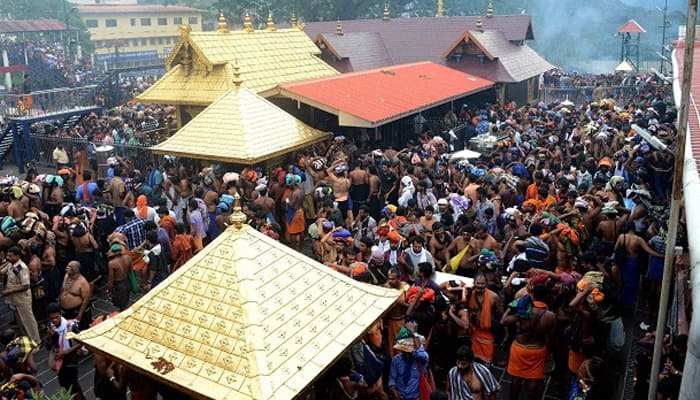New Delhi: Hearing the batch of petitions in Sabarimala temple case, a nine-judge Constitution Bench, headed by CJI SA Bobde, on Monday (January 13) clarified that it will not hear the review pleas but will consider 7 questions raised by the previous 5-judge bench.
The court also gave a time of three weeks to all the parties to decide on the framing of issues relating to women’s entry into Sabarimala temple and other religious matters.
The court ordered that the Secretary-General, Supreme Court, will convene a meeting of all the lawyers to discuss the framing of issues on January 17.
The Supreme Court is hearing the reconsideration petitions on its earlier verdict granting entry of women of all ages to the Sabarimala temple in Kerala.
Solicitor General earlier asked the apex court to clarify if polygamy practice will also be part of the hearing.
The 9-judge bench comprises Chief Justice SA Bobde, along with Justice R Bhanumati, Justice Ashok Bhushan, Justice L Nageswara Rao, Justice M Shantanagoudar, Justice S Abdul Nazir, Justice RS Ray Di, Justice BR Gavai and Justice Surya Kant.
The bench will primarily decide the extent to which the court can interfere in religious matters, considering the constitutional aspect of religious practices that prohibit the entry of women into religious places.
The SC was earlier reported to hear a batch of pleas on the issue of allowing women of all ages to enter Kerala's Sabarimala temple, along with other contentious issues of alleged discrimination against Muslim and Parsi women.
On November 14, 2019, a five-judge bench in a 3:2 majority verdict had referred to a seven-judge bench the pleas seeking review of the 2018 judgement. The top court had clubbed the restrictions faced by Muslim women in connection with the entry into mosques and dargahs and Parsi women, married to non-Parsi men, being discriminated from entering the Fire Temple.
In the majority judgement, the apex court had observed that the issues surrounding the constitutional validity of religious practices, which discriminate against women specifically in connection with their entry into a place of worship, were not limited to the Sabarimala temple case.
In 2018, the top court had allowed girls and women of all age groups to visit the Lord Ayyappa temple at Sabarimala in Kerala, following which a batch of review petitions was filed. Allowing their review petitions, the top court had last month referred the matter to a larger bench.
















